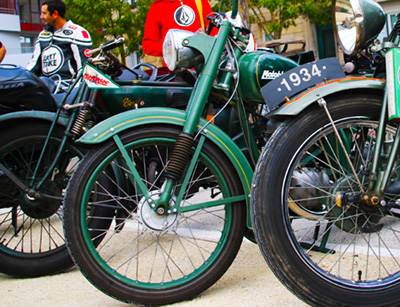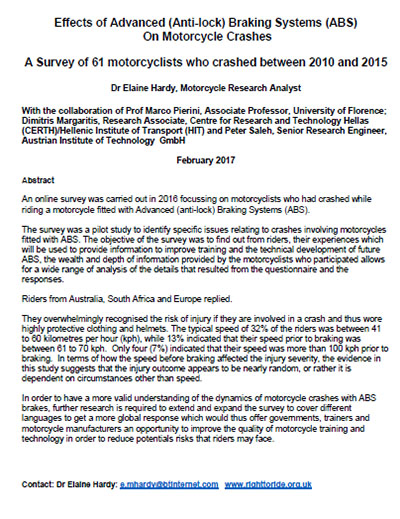 Effects of Advanced (Anti-lock) Braking Systems (ABS) On Motorcycle Crashes – A Survey of 61 motorcyclists who crashed between 2010 and 2015
Effects of Advanced (Anti-lock) Braking Systems (ABS) On Motorcycle Crashes – A Survey of 61 motorcyclists who crashed between 2010 and 2015
An online survey was carried out in 2016 focussing on motorcyclists who had crashed while riding a motorcycle fitted with Advanced (anti-lock) Braking Systems (ABS).
The survey was a pilot study to identify specific issues relating to crashes involving motorcycles fitted with ABS.
The objective of the survey was to find out from riders, their experiences which will be used to provide information to improve training and the technical development of future ABS, the wealth and depth of information provided by the motorcyclists who participated allows for a wide range of analysis of the details that resulted from the questionnaire and the responses.
Riders from Australia, South Africa and Europe replied.
They overwhelmingly recognised the risk of injury if they are involved in a crash and thus wore highly protective clothing and helmets.
The typical speed of 32% of the riders was between 41 to 60 kilometres per hour (kph), while 13% indicated that their speed prior to braking was between 61 to 70 kph.
 Only four (7%) indicated that their speed was more than 100 kph prior to braking.
Only four (7%) indicated that their speed was more than 100 kph prior to braking.
In terms of how the speed before braking affected the injury severity, the evidence in this study suggests that the injury outcome appears to be nearly random, or rather it is dependent on circumstances other than speed.
In order to have a more valid understanding of the dynamics of motorcycle crashes with ABS brakes, further research is required to extend and expand the survey to cover different languages to get a more global response which would thus offer governments, trainers and motorcycle manufacturers an opportunity to improve the quality of motorcycle training and technology in order to reduce potentials risks that riders may face.
Contact: Dr Elaine Hardy: www.righttoride.org.uk
Read The Report – Effects of Advanced (Anti-lock) Braking Systems (ABS) On Motorcycle Crashes – A Survey of 61 motorcyclists who crashed between 2010 and 2015 – Feb – 2017 – pdf – 470kb
Crashing With ABS – Survey Time – October 2016
Previous research by Dr Elaine Hardy – www.righttoride.org.uk


Hi Al,
I did previously do a near miss study a few years back, You might wish to read it here:
Near Miss Accident Survey of Riders – 2009 pdf – 1.37mb
Apart from that – the title of the study is clear “Effects of anti-lock braking systems in crashes”. If it were a near miss study – then it would have been “Effects of anti-lock braking systems in near misses”
I understand that the Motorcycle Safety Foundation USA did a study on near miss recently – here:
Overview of the MSF 100 Motorcyclists Naturalistic Study pdf – 4.26mb
If you are willing – why not do your own study on near miss crashes with ABS?
Best
Elaine
This survey seems somewhat flawed as it is asking about crashes and ABS not near misses and ABS. A request for feedback on near misses of both ABS and standard brake equipped motorcycles would have revealed more valuable data as the purpose of ABS is supposedly to prevent accidents, that leads to a question that may not have been on the survey; Was the accident caused or contributed to by ABS?
Many riders and even car drivers have experienced issues with ABS under certain conditions such as gravel roads and badly corrugated roads where the ABS effectively turns off the brakes by preventing them from locking when locking is required.
I hope any new surveys take my comments into account.
Motorbike Writer who helped communicating the ABS survey in Australia has published an article on the survey results.
While most motorcycles sold in Europe are mandated to have ABS fitted it is not so in Australia. As Motorbike Writer writes, “There are no calls in Australia yet for ABS to be mandated on bikes, but the Federal Chamber of Automated Industries and VicRoads say ABS is safe and a Monash Uni statistical study says it would save lives.
First real-world motorcycle ABS study
ABS will really save people that currently use dangerous braking method, to use front brake first. Since more often than not, they will be more likely to fall when they wrongly predict the road traction.
ABS may not increase safety of people who already use safe braking method, the one that use rear braking first.
ABS will not save people that use only rear brake.
Motorcycle Minds Comment: We had thought these comments a bit “controversial” given conventional thoughts/training on braking. However reading the blog from Sucahyo and where they are in the world maybe convention is not the better option? Via Google Translate – The author does not agree with the braking method that divides the front and rear portions.